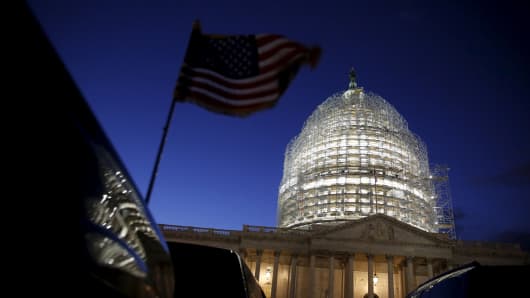Sally Sussman should have been one of the greatest and most fortuitous hires in the history of Pfizer.
The pharma giant hired Sussman to run their lobbying and governmental affairs efforts back in 2007. That was about a year before anyone could have known that Barack Obama, the man Sussman and her father had worked hard to bundle campaign funds for, was about to become the President of the United States. The Sussman family's efforts were so important to Mr. Obama's election, that her father Louis Sussman was given the plumb job of Plenipotentiary to the Court of St. James, which is the fancy way of saying "Ambassador to the United Kingdom." With those kinds of connections and Obama administration gratitude for their top lobbyist, Pfizer's biggest shareholders and key executives must have been overjoyed with the thought of working with the White House after the 2008 elections.
Read MoreForget Trump. Paul Ryan is the likely GOP nominee
But the Treasury Department's killing of Pfizer's $160 billion deal to buy Allergan with its crackdown on tax inversions this week proves things haven't worked out the way Pfizer thought they might. Despite having the best possible connections to the administration, the administration screwed Pfizer. The question is: does this mean that Pfizer simply got unlucky, or is the entire lobbying industry a bubble that's starting to burst?
First, let's quickly examine that lobbying industry and get an idea of its size and scope. The superb website OpenSecrets.org shows that total lobbying spending in the U.S. has more than doubled since 1998 to about $3.2 billion last year. The number of officially registered lobbyists has stayed about the same at about 11,000-12,000, but neither of those numbers really tell the whole story. The lobbying industry is much larger because those thousands of lobbyists employ tens of thousands of other businesses, lawyers, and other workers. Their influence is so great that they typically are the true authors of most legislation in Congress. And their lucrative salaries and lifestyle are a major reason why six of the richest ten counties in America are suburbs of Washington, D.C.
But while they're certainly influential and successful, lobbyists have never been very publicly popular. I can't remember the last time the word "lobbyist" was used in a sentence by someone who wasn't trying to demonize them. Beating up on them or calling them "special interests" is at least a 40-year-old tradition in political campaigns.
Read MoreWhy are states still passing awful 'religious freedom' laws?
So allow me to defend lobbyists for just a moment. No, I don't like all lobbyists or agree with their causes or corporate bosses. But I do like how lobbyist money and influence can often act as a great hedge against a dangerously one-sided ideology. It might be easy for politicians to dismiss almost half the electorate when they can still win elections in this country by as little as one vote. But when the losers in an election can still get their voices heard through new campaign donations and lobbyists, it's not always such a bad thing. Remember that the next time your candidate or party doesn't win in November.
But should the Pfizer story and the rise of politicians like Donald Trump and Bernie Sanders, who flaunt their supposed immunity to lobbyist influence, have all lobbyists worried? Not exactly. It's true that the Obama administration has decided to spurn some of the traditionally most powerful lobby groups. But it's not like they haven't been replaced by others. For example, the oil and coal industry has been replaced by green energy lobbyists, most heavily funded by people like Tom Steyer. The pro-Saudi Arabian and pro-Israel lobbyists have been replaced by lobbyists more sympathetic to Iran. The lists goes on.
But while the lobbying bubble isn't bursting, it's definitely seems to be shrinking somewhat. That's because the public's growing anger about the economy and against big corporations is making it politically easier for politicians to ignore lobbyists and seize more power in industry after industry. I'm talking about the big banks, energy, and telecom. Former Speaker Tip O'Neill may have been right when he said, "money is the mother's milk of politics," but politics and politicians truly crave power, not money. Lobbyist donations and favors are a great way to get that power, but elected officials and their bureaucrat staffers would just as soon take a more direct path to it when possible.
Read MoreWhy U.S. colleges get it all wrong
Pfizer and Allergan just learned that the hard way. Usually, a lame duck administration in its final year is filled with top-to-low level officials and staffers who are very eager to cull favor with private industry as they come closer to needing new jobs. Perhaps the folks at Treasury who wrote these anti-corporate tax inversion rules have safe government jobs for the coming years no matter who wins in November. Or maybe they know they're going to get nice positions at law firms where they'll be the resident experts on the arcane rules they wrote and only they understand. But for whatever reason, another industry with a history of effective lobbying has been taken down a peg and that will make it easier for the next administration to do the same. That's especially true if the populist nature of the Trump and Sanders campaigns endures even if they are personally defeated.
So lobbying isn't dead, or even dying. But it may be undergoing it's own kind of a recession. Let's see how long it lasts.



